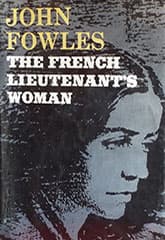The French Lieutenant's Woman
Critique • Quotes • At the movies
 First edition
First editionFirst publication
1969
Literary form
Novel
Genre
Literary, historical fiction, postmodern
Writing language
English
Author's country
England
Length
Approx. 148,500 words
The changing past
Sometimes it seems the English-speaking world spent the entire twentieth century trying to shake off the repressions of the Victorian era. The rebellious 1960s, for example, may have prided themselves on rejecting the lifestyles and mores of the immediately preceding decades, but the cultural upheaval of that time could as easily be seen as the continuing reaction to the conventions laid down in the preceding century.
The French Lieutenant's Woman, taking place in 1867, brings this to light in startling fashion. I'm not sure readers got that in 1969, when the book came out. I didn't when I read it the first time. But reading the book now, it seems obvious.
It helps that the English author includes himself in the novel. He remarks on the picture of Victorian lives as he is drawing it, noting differences and similarities to contemporary life a century later.
John Fowles had a ball re-imagining a Victorian romantic potboiler from a modern perspective. Playing with readers' expectations. Showing the perversities of social relationships that linger from that not-so-long-gone era. Digging, even in the midst of that established order, for the roots of our current rebellions. Noting the human mysteries that persist and befuddle us yet.
At times he adopts the style of that era. The long, convoluted sentence that opens the novel could have come from Charles Dickens or Jane Austen (slightly before the true Victorians, but references to her recur in the novel), which may be off-putting at first. But he soon settles down in to a more playful, direct style.
Fowles is often saddled with the postmodern label and The French Lieutenant's Woman called a meta-fictional work. This comes from the overall organization of the story. The reader is always aware of it being a fiction and is party to the author's thoughts about how he is shaping it, right down to his appearance in the novel as a character flipping a coin to decide how to end it. Now and then, he uses a professorial voice to drop in commentary on the Victorian tale, or goes off on a digression to explain the historical background.
A professor himself in real life, Fowles plays the academic to good effect, with learned quotations heading the chapters, references in the text to scientific and literary works of the time, plus the odd footnote.
But this isn't really heavy-duty postmodernism. I expect the deconstructionist and semiotic crowd must have considered The French Lieutenant's Woman a sellout to convention with a conventional plot at its centre and its joint appeal to both heart and head, that made it a huge bestseller. Both the nineteenth-century story and his later twentieth-century commentary are always quite accessible.
The distancing effects—the time skipping, the external commentary, the giving away of the plot, the author's god's-eye viewpoint—somehow do not prevent the story from engaging. Even the multiple endings, far from being confusing or disappointing, are surprisingly easy to take. They seem right.
And it's a good trick how the author's voice turns upon itself. The author's interruptions make clear that the old story you're reading is fictional...and yet that old story becomes as real as the author' voice, the author in the novel being a creation as much as the story, as far as we who hold the book in our hands can know.
But let's not take this too far. The novel never gets even close to the territory of Fowles's earlier sixties opus, questioning reality as The Magus did. The French Lieutenant's Woman never really seems bizarre.
Heroic and spineless
The central personalities of Sarah Woodruff, known to the seaside townsfolk as the "French Lieutenant's Whore" or "Tragedy", and Charles Smithson, a low-grade aristocrat and amateur paleontologist who is intrigued by her, are revealing while maintaining mysteries about their real characters. You can never be sure whether the elusive Sarah is sincere. Charles falls short of being either perfectly heroic or completely spineless. He means well (mostly)—a mildly progressive man for that era, but weak and fallible at vital junctures.
Even in the swelling romance of his late search for what he imagines is his great lost love, you can't help but wonder how selfless Charles has really become. He never escapes being a product of his class-conscious times.
The story evolves dialectically, pitting opposites and options against each other to find novel resolutions. Evolution lies at its heart. So we find among the literary quotations heading the chapters the scientist of evolution Charles Darwin, as well as the reformist and revolutionary political thinkers such as John Stuart Mill and Karl Marx (a lot of Marx actually)—alongside references to British literary figures of the time like Jane Austen, Tennyson, Matthew Arnold, A.H. Clough (I had to look that one up) and Thomas Hardy.
The biggest change heralded in the novel is the relationship of men and women. It's possible to read The French Lieutenant's Woman as a work of Women's Lib (as the women's movement was called in the day). In the destruction of Sarah Woodruff is shown in Hardy fashion the oppression of women, though with at least a potentially more liberating conclusion of self-deliverance than Hardy ever offered.
For Fowles, though, the question remains how far we've actually come from that time. The answers in the novel are incomplete, hinting at some progress and some stasis in the century since. In this way The French Lieutenant's Woman is as much a critique of recent attitudes as of the ever-lingering Victorian era.
— Eric
Critique • Quotes • At the movies

